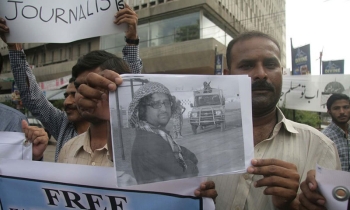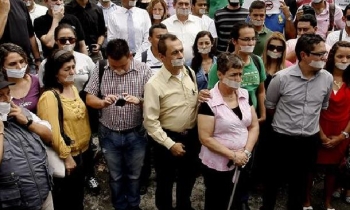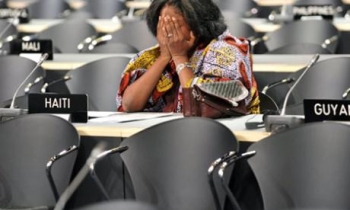The general in charge of Louisiana's hurricane relief has admonished reporters not to confuse questions with answers, and urged them to give the public facts -- not exaggerations and rumors that several media organizations now say corrupted coverage of Hurricane Katrina.
"Don't get stuck on stupid, reporters," Lt. Gen. Russel Honore first told them last week. "We are moving forward. And don't confuse the people, please. You are part of the public message. So help us get the message straight."
Several media organizations have examined, sometimes harshly, the work of newspapers and particularly cable-TV news networks.
The New Orleans Times-Picayune published a lengthy account Monday of errors, misrepresentations and wildly exaggerated claims of murder, rape and abuse of children at the New Orleans Superdome. The newspaper cited publication of "scores of myths about the dome and Convention Center treated as fact by evacuees, the media and even some of New Orleans' top officials."
Since the hurricane hit four weeks ago, estimates of deaths at the Superdome, for example, have been revised downward from 200 to 10, and four of those were heart attacks. One was a suicide, and one man is thought to have been pushed from a balcony to the floor hundreds of feet below. Police said one man found dead at the Superdome is thought to have been killed elsewhere.
Eddie Compass, the superintendent of New Orleans police, told television talk-show hostess Oprah Winfrey on Sept. 6 that "babies" were raped at the Superdome, and Mayor C. Ray Nagin told her on that broadcast that crowds at the Superdome had watched murder and mayhem.
"They have people standing out there, have been in that frickin' Superdome for five days watching dead bodies," Mr. Nagin said, "watching hooligans killing people, raping people."
Superintendent Compass announced his retirement yesterday. Mr. Nagin yesterday praised his tenure as police chief, but neither Superintendent Compass nor Mr. Nagin would say whether the chief was pressured to leave.
Television reporters, whose courage in the face of danger has been widely praised, are nevertheless accused of passing along fanciful accounts of mayhem. Rep. Peter T. King, New York Republican, accused MSNBC's Chris Matthews of "distorting reality" on a broadcast Monday.
"You are distorting reality," he told him. "And that's the problem with you. You and MSNBC have carried away with this. You should all be ashamed of yourself."
New Orleans District Attorney Eddie Jordan told the Associated Press yesterday that officials at the morgue in St. Gabriel, La., have identified four homicide victims from New Orleans. All were shot; all were adults. He said police had arrested one person on suspicion of attempted sexual assault but had received no official reports of rape.
However, Judy Benitez, executive director of the Louisiana Foundation Against Sexual Assault, says it is too soon to discount accounts of rape at the Superdome.
"It is extremely difficult to get good statistics about rape under normal circumstances, and these are certainly not normal circumstances."
Both victims and rapists are scattered across the country, she noted.
Media analysts noted that conditions in New Orleans were chaotic and that reporters relied on fragmentary accounts, collected from often unverifiable sources.
"The fog of war and the gusts of a hurricane both cloud and obscure vital truths," said Matthew Felling of the Center for Media and Public Affairs.
"What we're seeing here is no different than the reports of museum looting right after U.S. troops entered Baghdad. It's not that different from election night 2000 when some journalists prematurely declared a winner. In all three cases, the public would have been served by a bit more patience and less feigned certainty."
A Gallup poll released yesterday found that 37 percent of the respondents don't regard most media accounts as reliable, and 12 percent said they have no trust at all. The poll of 921 adults was taken Sept. 13 to 15.
The chaos in the wake of Katrina seemed to affect some reporters and editors, says Kelly McBride, who teaches ethics at the Poynter Institute, a journalism research and education center in St. Petersburg, Fla.
"You get so hung up as a reporter on what the big picture is that you use generalizations that become untrue."









